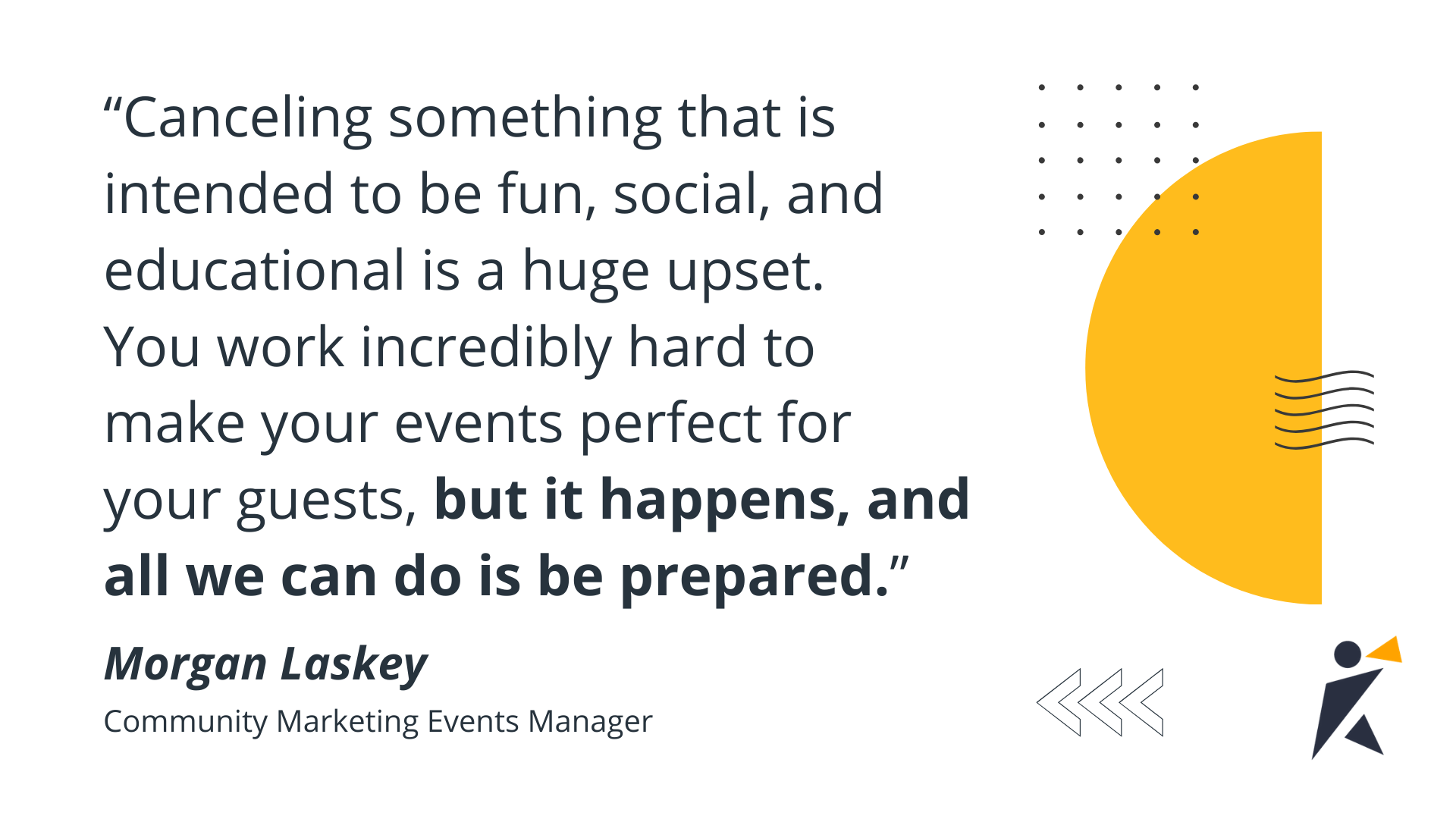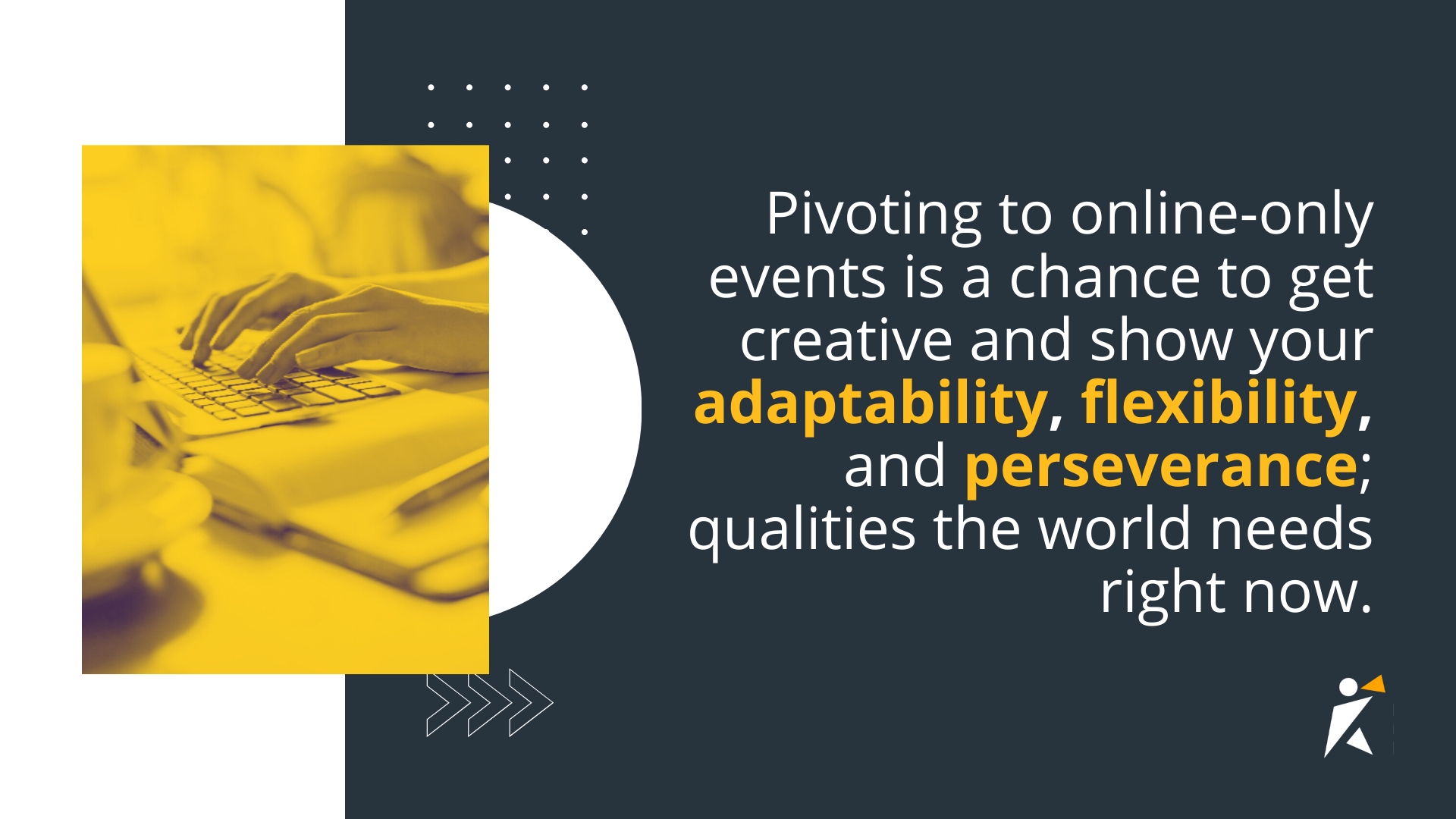Don't postpone. Pivot to virtual

Event organizers around the world are trying to figure out right now—should we postpone?
When faced with the options of canceling or postponing, cancellations should be the last resort, but while postponement gives temporary relief, it poses some key issues.
For starters, postpone until when?
What if all events are pushed back? What will Q4 look like with more than half the year’s events crammed into that one period?
Will the economic situation even be the same after this?
This post will look at these 3 issues and then make a case for pivoting to virtual experiences, at least for the foreseeable future.
Postpone… until when?
Looking at the current international situation, things are changing daily with lockdowns and travel bans in effect to varying degrees around the world.
Based on the timeline of Wuhan’s experience with the outbreak, the virus will likely peak at the three-month mark, USA Today reports. However, there are a few problems with relying on the three-month mark.
Passing the peak doesn’t mean it’s over
Just because there was a peak doesn’t mean it was the peak.
Reaching the peak doesn't mean we're in the clear, it only means that the epidemic has started to slow down, according to experts.
Even if the number of cases starts to fall in the next three months, it will be too soon to fully return to normal. It will likely take a long time for this tide to go out—possibly years.
Is the “three-month mark” accurate?
On Thursday, China announced its first day with no new locally transmitted cases. The world breathed a sigh of relief (as well we should). However, getting the virus even somewhat under control in China took extreme measures.
They went on full-lock down, including residential lockdowns of varying strictness, from checkpoints at building entrances to severe limits on going outdoors. Lockdowns now apply to at least 760 million people in China, or more than half the country’s population. The strict quarantine and travel restrictions have been in place for weeks.
This has not been the case across the globe, and we have no idea what the trajectory is for countries late in adopting restrictions, so we have to ask whether the three-month mark is a feasible figure. At the moment, we simply do not know.
What will happen if everyone postpones
Many events are tentatively being postponed until the last three months of 2020. This seems to be the safest choice, as a summer timeline looks less and less likely.
This will likely result in a massive number of events being packed into October, November, and December.
Bigger events will be at an advantage for pulling in attendees, but for medium to small events there will be stiff competition to fill seats with multiple postponed events running alongside the events already planned for that period.
On top of this, there will likely be difficulty with venues who may already have full calendars for the last quarter—it could end up being a rescheduling nightmare, if not impossible to do.
This is also provided that the travel bans are lifted by this time, the economy bounces back, and that the virus does not make a reappearance in the fall.
Post-COVID-19: A big question mark
Postponement also makes the assumption that national economies and the ease and cost of international travel will bounce back immediately within the next few months.
Looking at the instability in the market, border closures, travel bans, and complete overturn in most industries, things are unlikely to simply bounce back within a few weeks. Recession may hit many countries. It might not be wise to assume everything will return to where we were in January. It will likely take time.
Take one example: if several airlines go out of business, this could have a major impact on the cost of air travel, with the cost of flights going up substantially, if your event is made up mostly of non local participants, this could severely impact attendance.
Although unlikely, it is possible that the virus is contained, or a vaccine is found, causing the virus to disappear, and normalcy returns easily, please take this advice with some caution. Stay up-to-date on what is happening in your region.
Postponement vs. pivot to online-only
“Canceling something that is intended to be fun, social, and educational is a huge upset. You work incredibly hard to make your events perfect for your guests, but it happens, and all we can do is be prepared.”
-Morgan Laskey, Community Marketing Event Manager

Instead of postponing, many event organizers are opting to run virtual events. Adobe Summit, Facebook F8, and Google I/O have all cancelled the in-person aspect of their conferences, and have pivoted to online-only.
Luckily, online events are nothing new, and the technology has already been developed to support this switch. This being said, converting a large conference into an online-only event within a few weeks requires research, investment, expertise and a lot of hard work.
Here are some examples of organizations who have pivoted their events in recent weeks,
-
The Geneva International Motor Show had to cancel its live event, in its place they will offer pre-recorded and live-streamed press conferences.
-
Salesforce’s decision to turn its Sydney World Tour event to online-only gave the organization’s team less than 2 weeks to reinvent an event that was planned to feature more than 150 presentations. By day 10, the first session had been recorded, followed by approximately 100 more, most of which were live-streamed.
-
Domopalooza cancelled its event saying, “We made the decision to transform Domopalooza 2020 from an in-person event for 3,000 people in Salt Lake City, Utah, to one that is 100% digital.” Their virtual event includes breakout sessions and keynotes in an online format.
-
IBM’s Think conference will go completely digital. The company will combine locally-hosted activities with virtual events. It includes live-streaming content and interactive sessions.
(These examples came from SocialMediaToday. Read the full article here.)
A lot of event organizers are realizing that while changing an entire itinerary over to online can be a tremendous amount of work, there can be a lot of long-term benefits.
Online-only is a better solution right now
It is clear the strategy of canceling all live-events or postponing to an unknown future date is not sustainable in the long-term.
Don’t wait to find out whether or not the crisis will pass by the summer. Instead, put together your assets now, and research what is possible.
Here are a few great reasons to go virtual:
A better option than canceling. Cancellations can mean revenue loss and disappointed attendees. Online-only events can help mitigate both the financial and branding impact on your organization while providing a safe and enriching experience for your audience.
Global online audience: The widespread diffusion of the internet has made it possible for just about everyone to connect globally. With varying degrees of social distancing in place in most regions around the world, many people are shifting more and more to working online. Video conferencing, webinars, and group chats are quickly becoming the norm.
Long-lasting, flexible content: The recordings you make can become a valuable library of resources. A video can be shared online, repurposed into shorter clips, an audio file, a transcription. The transcription could be shortened and turned into articles and guides. Once the live-online conference is over, you can create a ton of content your audience can come back to time and again.
More accessibility: You will have access to an audience who may not have considered going to a live event for various reasons such as cost, travel, time, but would be inclined to attend digitally. And online, everyone gets a front-row seat.
Creative potential: Get innovative with content formats, add videos and animations, breakout groups, online-networking events, even dance parties—the internet is well known for its ability to engage audiences for hours on end, be creative in how you utilize this.
Wrapping it up
Pivoting to online-only events may not be easy, but at least you know what you are facing. It is also a chance to get creative and show your adaptability, flexibility, and perseverance; qualities the world needs right now.

Instead of canceling or postponing, start thinking about what options you have to change to an online experience. It can push you and your team’s creativity and innovation and help you connect with completely new audiences. It is also the best option we have at the moment.
Looking for the perfect speaker for your next event? SpeakerHub helps connect event organizers from thousands of speakers from around the world, for free.







